

Big Thinkers: Howard Gardner on Multiple Intelligences. Howard Gardner: We have schools because we hope that someday when children have left schools that they will still be able to use what it is that they've learned.
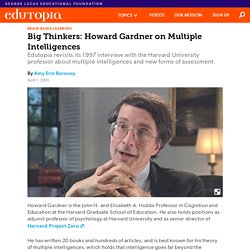
And there is now a massive amount of evidence from all realms of science that unless individuals take a very active role in what it is that they're studying, unless they learn to ask questions, to do things hands-on, to essentially recreate things in their own mind and then transform them as is needed, the ideas just disappear. The student may have a good grade on the exam. We may think that he or she is learning, but a year or two later there's nothing left. The idea of multiple intelligences comes out of psychology. We have this myth that the only way to learn something is read it in a textbook or hear a lecture on it, and the only way to show that we've understood something is to take a short-answer test or maybe occasionally with an essay question thrown in.
So let's take the area of science. Activities for Active Learning. Active and Cooperative Learning. The past decade has seen an explosion of interest among college faculty in the teaching methods variously grouped under the terms 'active learning' and 'cooperative learning'.
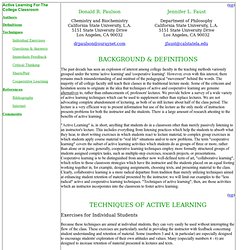
However, even with this interest, there remains much misunderstanding of and mistrust of the pedagogical "movement" behind the words. The majority of all college faculty still teach their classes in the traditional lecture mode. Some of the criticism and hesitation seems to originate in the idea that techniques of active and cooperative learning are genuine alternatives to, rather than enhancements of, professors' lectures. We provide below a survey of a wide variety of active learning techniques which can be used to supplement rather than replace lectures. We are not advocating complete abandonment of lecturing, as both of us still lecture about half of the class period. "Active Learning" is, in short, anything that students do in a classroom other than merely passively listening to an instructor's lecture. How Technology Can Improve Learner-Centered Teaching. For faculty looking to create a more learner-centered environment there are always a few bumps in the road.
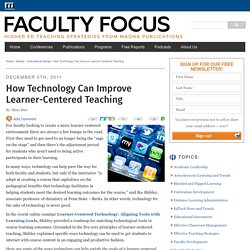
First they need to get used to no longer being the “sage on the stage” and then there’s the adjustment period for students who aren’t used to being active participants in their learning. In many ways, technology can help pave the way for both faculty and students, but only if the instructor “is adept at creating a course that capitalizes on the pedagogical benefits that technology facilitates in helping students meet the desired learning outcomes for the course,” said Ike Shibley, associate professor of chemistry at Penn State – Berks. In other words, technology for the sake of technology is never good. In the recent online seminar Learner-Centered Technology: Aligning Tools with Learning Goals, Shibley provided a roadmap for matching technological tools to course learning outcomes.
Here are some of the ways technology can help satisfy the goals of a learner-centered classroom: 1. Metacognition and Student Learning - Do Your Job Better. By James M.
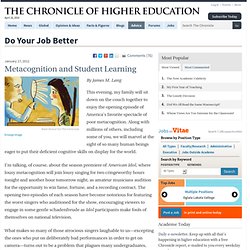
Lang This evening, my family will sit down on the couch together to enjoy the opening episode of America's favorite spectacle of poor metacognition. Along with millions of others, including some of you, we will marvel at the sight of so many human beings eager to put their deficient cognitive skills on display for the world. I'm talking, of course, about the season premiere of American Idol, where lousy metacognition will join lousy singing for two cringeworthy hours tonight and another hour tomorrow night, as amateur musicians audition for the opportunity to win fame, fortune, and a recording contract. The opening two episodes of each season have become notorious for featuring the worst singers who auditioned for the show, encouraging viewers to engage in some gentle schadenfreude as Idol participants make fools of themselves on national television.
Cognitive psychologists use the term metacognition to describe our ability to assess our own skills, knowledge, or learning. Metacognition. Active Learning. 5 Videos That Describe New Learning. What new learning actually is depends on who you talk to.
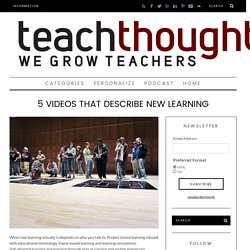
Project-based learning infused with educational technology. Game-based learning and learning simulations. Self-directed learning and learning through play. eLearning and mobile learning to promote personalized learning for every child. Below are five videos that describe what some of these approaches look like, and why they make sense for us to consider. 1. 2. 3. 4. 5. Image attribution flickr user nicsevents. Learning Styles.